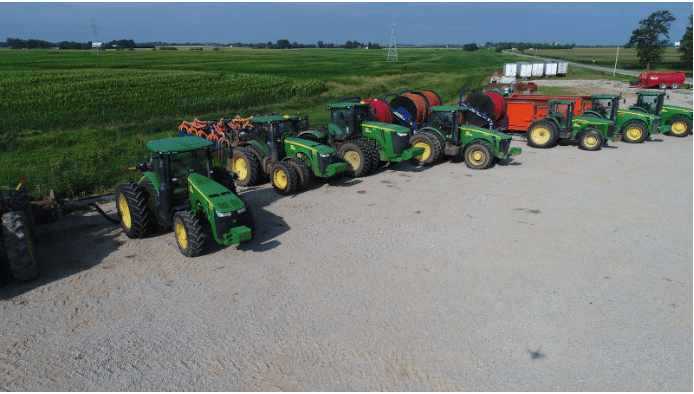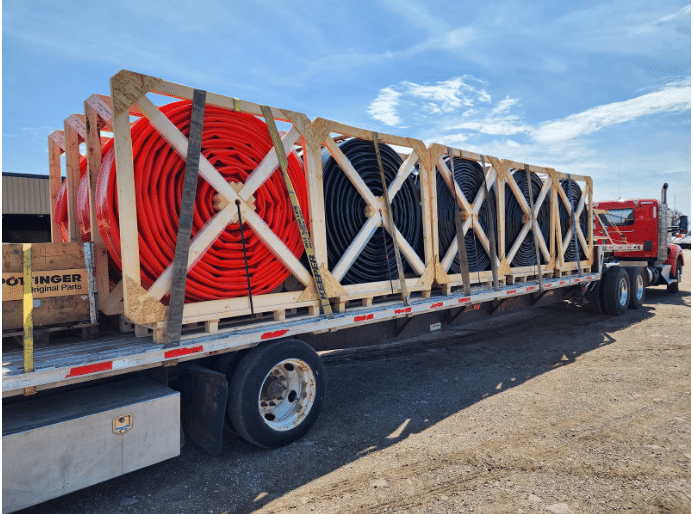Key Signs It’s Time to Upgrade Your Used Manure Equipment

Reliable manure equipment lineup ready for high-efficiency nutrient application across dairy fields.
Why Upgrading Matters
Reliable, well-functioning manure equipment is essential for efficient nutrient management and smooth daily operations. Pumps, hoses, and toolbars all work under high pressure and heavy use—and when they start to wear out, performance drops fast. Continuing to run outdated or failing equipment doesn’t just slow your farm down—it costs time, money, and fuel. Knowing when to upgrade to the Best Used Manure Equipment can save thousands in repairs and prevent downtime during the busiest manure application windows.
1. Frequent Breakdowns
If your pump, power unit, or hose reel seems to break down every few weeks, it’s a strong sign the system is nearing the end of its life.
Constant breakdowns not only rack up repair bills—they can cause costly delays when weather or crop schedules don’t wait. A modern setup minimizes maintenance and keeps you moving when the window to apply manure is short.
2. Slower Performance
A dragline system or pump that once ran efficiently but now struggles to maintain pressure or flow likely has worn internal parts—such as impellers, bearings, or seals.
If your gallons per minute (GPM) rate is dropping despite a clean hose and proper setup, the equipment’s efficiency is declining. Upgrading to newer manure pumping equipment ensures consistent performance across more acres with less horsepower.
3. Rising Repair Costs
It’s normal to replace a few seals or bearings each season—but if repairs are becoming constant or expensive, the system may no longer be worth fixing.
When annual maintenance costs start to approach the value of the machine itself, that money is better invested in a new or reconditioned manure pump or toolbar that delivers better reliability and long-term savings.
4. Lacking Safety Features
Safety in pumping operations is critical. Older pumps and power units often lack emergency shutoffs, pressure monitoring systems, or reliable hose clamps.
Newer systems include automatic pressure relief valves, better guarding, and remote monitoring, helping crews stay safe in the field. If your equipment feels risky to run, upgrading is a safety investment—not just an operational one.
5. Hard-to-Find Replacement Parts
Many older pumps, reels, and hose systems are discontinued. Waiting weeks for a replacement impeller or drive shaft during peak season can shut your operation down.
If you’re spending more time hunting for parts than applying manure, it’s time to transition to newer, supported models. Modern systems from suppliers like Phil’s Pumping & Fabrication are designed for long-term parts availability and service support.
6. High Fuel Consumption
Outdated engines and inefficient pumps waste fuel and deliver less performance. If your fuel usage keeps climbing while productivity falls, it’s a clear efficiency issue.
Upgrading to modern engine-driven power units or hydraulic systems can reduce fuel costs dramatically—especially for applicators covering large acreages or running multiple systems daily.
7. Outdated Technology
Manure handling technology has advanced rapidly. Modern systems feature flow meters, GPS rate control, and improved hose materials that reduce friction loss and wear.
If your system lacks flow tracking or rate control, you’re likely over- or under-applying nutrients—and leaving money on the table. Upgrading helps ensure accurate application, regulatory compliance, and better soil stewardship.
8. Reduced Output and Inconsistent Application
If your toolbar struggles to keep a consistent spread pattern or pressure fluctuates throughout a job, the system is no longer performing efficiently.
Low output or uneven application affects nutrient distribution, crop growth, and fuel costs. Upgrading ensures consistent flow, faster turnaround, and healthier fields.

High-quality manure hoses being delivered for system upgrades and improved field performance.
Finding the Right Manure Equipment for Sale
When you’re ready to upgrade, take time to evaluate options carefully. Quality manure equipment for sale—whether new or used—can deliver years of reliable service if chosen correctly.
Here’s what to check before buying:
- Inspect pump housings, bearings, and hose ends for visible wear.
- Review maintenance records, especially on used manure pumps or power units.
- Match the pump and hose size to your typical flow rate and distance.
- Compare flow meter calibration and rate control features.
- Choose systems from reputable manufacturers with local parts support.
Taking these steps ensures you’re not just replacing equipment—you’re upgrading your entire operation’s efficiency.
Conclusion
Farming is demanding enough without equipment failures holding you back. If your used manure equipment breaks down often, burns excess fuel, or can’t keep up with field demand, upgrading is a smart move.
Modern manure pumping systems are faster, safer, and far more efficient than older models—and with options for new and used inventory, the investment can fit nearly any budget.
Don’t wait until the next breakdown costs you an entire day of pumping. Upgrading your manure system today will save time, reduce fuel costs, and keep your farm running at full capacity for years to come.
👉 Looking for dependable Manure Equipment for Sale? Visit Phil’s Pumping & Fabrication to explore new and used systems across the U.S. and Canada—or follow us on Instagram for equipment listings and expert tips.
FAQs
- What’s the average lifespan of manure equipment?
With proper care, pumps and hose systems can last 8–12 years, but heavy custom application use may shorten that. Frequent breakdowns are a clear sign it’s time to upgrade. - Should I buy new or used manure equipment?
New equipment offers the latest features and reliability. Used equipment can be a cost-effective option if it’s been properly maintained and tested. - How do I know if it’s worth repairing?
If repair costs exceed half the value of the machine—or if major components like the pump housing or power unit are failing—it’s typically more cost-effective to replace. - Do new manure systems save fuel?
Yes. Newer pumps and engines are designed for high flow at lower horsepower, reducing overall fuel usage while increasing output. - Where can I find reliable manure equipment for sale?
Check with trusted suppliers like Phil’s Pumping & Fabrication, which offers both new and used systems, plus maintenance and parts support across North America.
